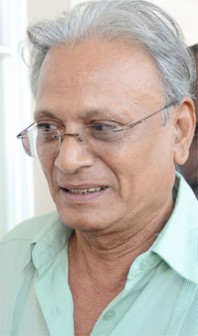Vice-Chairman of the main opposition A Partnership for National Unity (APNU) Dr. Rupert Roopnaraine yesterday asked the National Assembly to consider setting up a Special Select Committee to examine the sugar industry, since its decline seems likely to continue.
“To be told [in the 2012 budget] that the [sugar] industry will produce 5.7 percent more in 2012 than in 2011 is not compelling or as impressive as it was designed to sound,” he said during his contribution to the budget debate yesterday, while noting that the industry produced 237,000 tonnes in 2011, 26 percent less than the projected 298,000 tonnes for that year and 37 percent less than the highest production in recent years of 325,159 tonnes in 2004.

“[The Minister of Finance Dr. Ashni Singh] told us that Skeldon would achieve its full potential by the second crop of 2011, it did not, and in fact produced less sugar than the Albion, Rose Hall and Blairmont estates,” he added.
“All verifiable indications in the industry point not to recovery but to continuing decline. Now that the ailing industry comes under the purview of the former Minister of Health, perhaps we will get a more scientific diagnosis of the ailment and an explanation of why the past and current prescriptions are not having the effect of restoring the patient to full and good health,” Dr. Roopnaraine further said.
He noted that the GuySuCo Board has not shown creativity in managing the ailing corporation, which he said remains of properly enduring importance to Guyana.
Turning to the affairs of the Parliament, Roopnaraine accused the government of an interpretation of the togetherness that amounted to “take it or leave it.”
“Of course, Mr. Speaker, going it alone had been the option from October 1992 to October 2011 – the 19 years when the PPP enjoyed an exercise of majority control in this Honourable House. Togetherness for them…was a take it or leave it invitation to opposition parties in this House…going it alone is no longer an easy or even achievable option,” he said. “Working together is no longer a ritual gesture of condescension and hospitality to well-behaved guests. Instead, it heralds a new political epoch and an opportunity for the nurturing of a new political culture,” he added.
According to Roopnaraine, in the work of building the new political culture over the days, and weeks and months and years to come, “we on this side of the House will not be found wanting.”
He added that what was once an aspiration or a desirable objective is now a practical imperative. The government understands this fact, he further noted, even though it continues to display the “inability” to break with the old habits acquired over the 19 years of one party rule. “But break with them they must if the talk of a new political culture [as mentioned in the budget speech] is to be more than talk,” he said.
Roopnaraine said he agreed wholeheartedly with Singh when he spoke of the new dispensation testing and hopefully proving the resolve of MPs as a people. “I trust that he will wholeheartedly agree with me when I say that it will test and prove the resolve of both sides of this Honourable House. He is right to alert us all – those of us on this side and no less his colleagues on the other side – that as much as the current dispensation provides important opportunities, so it is fraught with formidable challenges,” he said. “I give him and all of my honourable friends on the government benches the fullest assurance that we, on this side, will seize fully the opportunities and rise to the challenges, however, formidable. As is well known to all and sundry, near and far, APNU campaigned long and hard throughout the length and breadth of Guyana on a platform of a government of national unity. We are the last people who need to be persuaded that there is no higher duty than combining our energies to heal the divisions that plagued our people since the derailing by the colonial powers of our national democratic revolution in October of 1953,” he added.
Roopnaraine also said the Standing Committee on Constitutional Reform should have been the most active during the Eighth and Ninth Parliaments, “given the defects and aberrations in our systems of government.” But it was in fact the least active, he said. He said that since the APNU is ready to work towards remedying these defects, “We are of the view that this House should move urgently to establish anew a Constitutional Review Commission to democratise, widen and deepen the work of the standing committee.”
In addition, Roopnaraine called for the government to get the necessary arrangements in place for the holding of local government elections. He also called for the appointment of an Ombudsman, for the establishment of the Public Procurement Commission as well as appellate tribunals and for the financial independence of a number of statutory bodies, in accordance with the constitution.




